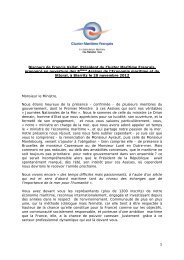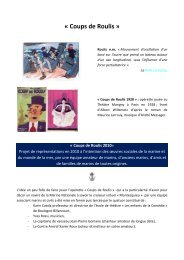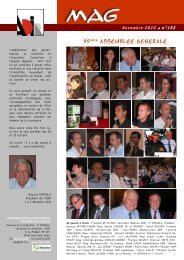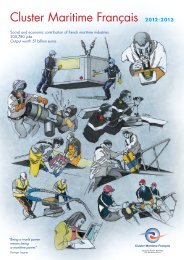angalis mep 2009 - Le Cluster Maritime Français
angalis mep 2009 - Le Cluster Maritime Français
angalis mep 2009 - Le Cluster Maritime Français
You also want an ePaper? Increase the reach of your titles
YUMPU automatically turns print PDFs into web optimized ePapers that Google loves.
COFREPECHE<br />
43<br />
le cluster maritime français<br />
The French Consortium for Fisheries Development (COFREPECHE – “Consortium <strong>Français</strong> pour le Développement des<br />
Pêches”) is a worldwide fisheries consultancy company established in 1980 jointly by professionals of the fisheries sector<br />
and Ifremer, the well known French Marine Research Institute (Institut français de recherche pour l'exploitation de la mer).<br />
The sustained deployment of special French then Spanish purse seiners in the Indian Ocean during the 80’s was their<br />
first success story. Since then, experts from COFREPECHE have travelled all over the world to carry out studies and assessments<br />
and to provide technical assistance and engineering supervision aimed at sustainable management of the sector and<br />
job creation. With significant experience and ‘know-how’ gained in several countries, Cofrepeche has become a key international<br />
partner in fisheries and aquaculture consultancy.<br />
Coopération <strong>Maritime</strong><br />
La Coopération <strong>Maritime</strong> française is a grouping of around 130 maritime cooperatives covering five branches of activity<br />
(provisioning – social matters, vessel ownership – management, producers’ organisations – the wholesale fish trade,<br />
marine fish farming, mutuals and insurance). Its brief is to represent, defend, stimulate and promote the fisheries sector<br />
and marine fish farming.<br />
SFAM (Syndicat <strong>Français</strong> de l’Aquaculture Marine et Nouvelle)<br />
m<br />
CMF member<br />
The SFAM groups together the great majority of French producers of marine and new species (sea-bass, gilt-head sea-bream,<br />
sturgeon, meagre, salmon and turbot). The production of the sector represents approximately 65 million juveniles (of which<br />
more than 70% are for export), 7,500 tons of table fish and 15 tons of caviar. Based near Bordeaux, the SFAM participates<br />
in the work of all bodies related with the sector and is pushing for sustainable growth since French aquaculture products<br />
currently represent a mere 2% of consumption of marine food products in France.<br />
Shellfish farming is the most widespread aquacultural activity in France. Marketed production<br />
of farmed shellfish is estimated at 190,000 tonnes with a value of 381 million euros, or 70%<br />
of the total value of French aquaculture production (source DPMA) and 22% of total French<br />
production of aquatic products (fish and aquaculture).<br />
Marine pisciculture, an activity of increasing expertise, should continue to grow.<br />
• It produces three main species: bass, gilthead sea bream and turbot.<br />
• Marine pisciculture accounts for 12% of the turnover of the fish farming sector.<br />
Sea products also include resources on the sea bottom such as aggregates:<br />
UNPG<br />
The French Aggregates Association (UNPG) represents companies producing aggregates from marine deposits. Of the<br />
400 million tons of aggregates produced annually, 7 million come from marine deposits. The marine aggregates sector<br />
consists of 12 companies and employs 200 shipboard and 100 shore staff. 15 dredgers unload these aggregates at 20<br />
French ports. The market is worth e70 million.<br />
The UNPG represents the mutual interests of its members. Its role is to provide them with assistance and information<br />
in a range of fields, such as access to mineral resources, environmental protection, product quality, economic trends,<br />
legislation, etc.<br />
fact<br />
CMF member - www.cofrepeche.fr<br />
CMF member - www.cooperationmaritime.com<br />
CMF member - www.unpg.fr<br />
Several French fisheries lead the world in quality, in both biological and economic terms, e.g. prawns<br />
and scallops...<br />
© Jean-Pierre Duval







